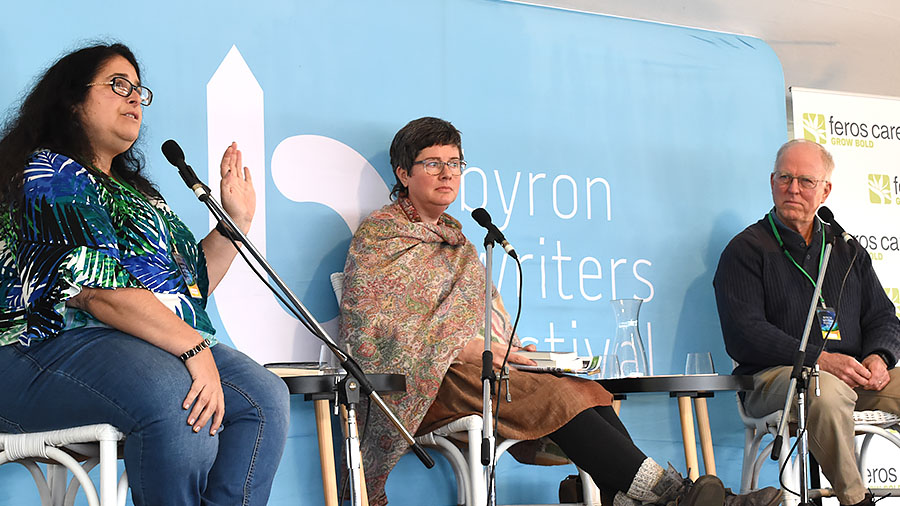Fire and jellyfish: Notes on abundance from Mother Earth

We are living in the Anthropocene, the geological age in which human activity has become the dominating influence on the climate and environment. Yes, it is our fault that things are getting out of balance, and we know it.
There are so many of us humans on this planet that we are creating conditions ripe for other powerful forces, jellyfish and fire among others, to take over environments we share with them as well.
Session chair Sophie Cunningham, author City of Trees: Essays on Life, Death and the Need for a Forest, asked her panelists to explain how human presence has been interacting with and transforming landscapes.
Stephen Pyne, an emeritus professor at Arizona State University specialising in fire history, and Lisa-ann Gershwin , a biologist and expert on jellyfish, spoke about how these forces of nature are becoming out of control due to human influences on the environment.
Pyne, a self-proclaimed ‘pyromantic’, has published over 30 books including his most recent publication, Fire: A brief history.
He believes more understanding about ‘good fires’ is needed as well as a focus on the reduction of fossil fuel combustion.
However, Pyne said the ultimate task at hand is the need to ‘recover our heritage as fire creatures’ since we have become so disconnected with fire due to the notion that its use ‘identifies as primitive’.
He explained that we are no longer cooking with fire, or are using it to heat our homes, going without the ‘rational alternative’.
The panel discussed the importance in taking a ‘humanities approach’ to sharing ideas and research about the sciences.
‘We can’t write about fire without humans,’ Pyne said.
Gershwin said she enjoyed involving ‘non-scientists’ and would invite visitors of the Cabrillo Marine Aquarium into her ‘broom closet’ laboratory to watch jellyfish being born.
It was clear the panel were extremely passionate about their topics, with Gershwin finding common ground through joking about being ‘into things that burn… things that hurt’.

It didn’t take the audience long to catch Gershwin’s infectious passion for jellyfish, as she described her encounter with the ‘lava lamp-like things’ that swum in an aquarium as if they were ‘hanging like clouds in the sky’.
‘They mesmerised me,’ she said with a massive grin. ‘I wanted to be around that more.’
But there is a darker side hidden by their beauty.
Gershwin wrote her book Stung! after the revelation that few people understand that jellyfish blooms are ‘super abundances taking over the world’.
Literally.
Super abundances are a ‘visible indication that something is out of balance’, Gershwin said. They are the ‘inheritor of damaged ecosystems’ which ‘wipe out the food chain at the base’.
The cause of this abundance, Gershwin theorises, is due to global problems such as the warming of water, over-fishing and pollution, all of which jellyfish benefit from.
‘They love it,’ Gershwin said. They are the ‘cockroaches of the sea’.
Although she claimed to be pessimistic about the situation, she did reveal that even though ‘we can’t get changes back… that doesn’t mean we won’t get something good,’ which earned her a large round of applause from the audience.
An audience member asked about eating jellyfish. Gershwin said they have a texture that reminds her of cucumbers and rubber-bands.
However, Gershwin told the audience to ‘watch this space’ for a ground-breaking innovation, transmuting this abundance of jellyfish into a fat-replacement used in baked goods and sanitary products.
She enthusiastically reassured the audience that the jellyfish muffins actually taste really good.
Libby Lawler is a Southern Cross University Digital Media & Communications graduate. Southern Cross University students have reported on Byron Writers Festival since 2010. Find out where a degree from Southern Cross University can take you.
